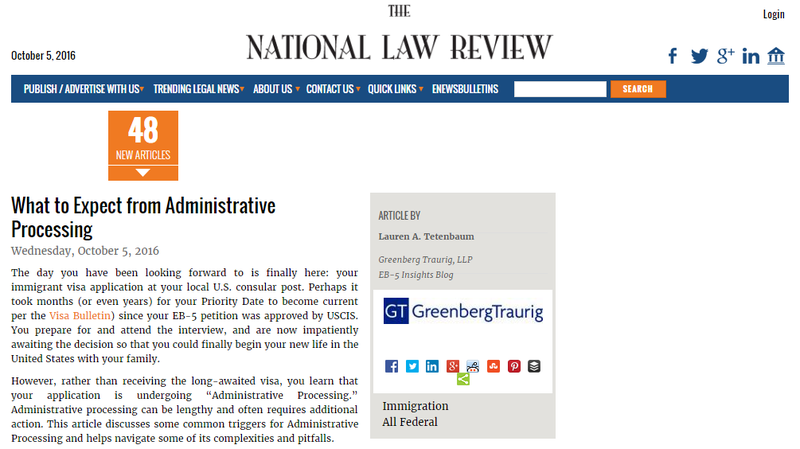The day you have been looking forward to is finally here: your immigrant visa application at your local U.S. consular post. Perhaps it took months (or even years) for your Priority Date to become current per the Visa Bulletin) since your EB-5 petition was approved by USCIS. You prepare for and attend the interview, and are now impatiently awaiting the decision so that you could finally begin your new life in the United States with your family.
However, rather than receiving the long-awaited visa, you learn that your application is undergoing “Administrative Processing.” Administrative processing can be lengthy and often requires additional action. This article discusses some common triggers for Administrative Processing and helps navigate some of its complexities and pitfalls.
Most commonly, an immigrant visa application is placed in administrative processing when the Department of State must conduct additional background/security checks. Background/security checks are usually resolved within 60 days of the interview; however, this timeframe is not guaranteed and may vary depending on the unique facts of each case. During administrative processing, the consular post retains the applicant’s passport. If urgent travel is required, the applicant may request for the passport to be returned temporarily and resume the processing of the visa application at a later time.
Sometimes, administrative processing is triggered because additional documentation is required from the applicant. Under section 221(g) of the Immigration and Nationality Act, a visa cannot be issued to a foreign national if it appears to the consular officer that the applicant is ineligible to receive the visa under various regulations. In administrative processing cases pursuant to section 221(g), the applicant is provided with a so-called 221(g) Notice, which would contain specific instructions with regard to the required documentation and the manner of delivery to the consulate. As we have previously addressed, the issuance of the 221(g) Notice effectively suspends the visa application; such administrative processing technically constitutes a denial, and should be classified as such in any future U.S. visa applications if applicable.
Remember that the timing of resolving administrative processing varies depending on each case, and typically it is necessary to wait 60 days after the interview or submission of additional information before inquiring about the progress. Additionally, each consular post has its own requirements and systems regarding submitting additional information, following up on case status, and collecting passports during or after administrative processing. In part because of the potential to be placed in administrative processing, the Department of State advises that visa applicants should refrain from making nonrefundable travel or other plans until their visas are issued and passports returned.
http://www.natlawreview.com/article/what-to-expect-administrative-processing
Mentions
States
- New York
Videos





Subscribe for News
Site Digest
Join Professionals on EB5Projects.com →
Securities Disclaimer
This website is for informational purposes only and does not constitute an offer or solicitation to sell shares or securities. Any such offer or solicitation will be made only by means of an investment's confidential Offering Memorandum and in accordance with the terms of all applicable securities and other laws. This website does not constitute or form part of, and should not be construed as, any offer for sale or subscription of, or any invitation to offer to buy or subscribe for, any securities, nor should it or any part of it form the basis of, or be relied on in any connection with, any contract or commitment whatsoever. EB5Projects.com LLC and its affiliates expressly disclaim any and all responsibility for any direct or consequential loss or damage of any kind whatsoever arising directly or indirectly from: (i) reliance on any information contained in the website, (ii) any error, omission or inaccuracy in any such information or (iii) any action resulting therefrom.



